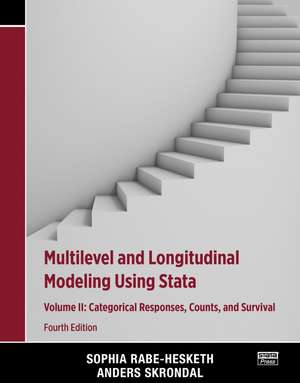Multilevel and Longitudinal Modeling Using Stata, Volume II: Categorical Responses, Counts, and Survival
Autor Sophia Rabe-Hesketh, Anders Skrondalen Limba Engleză Paperback – 22 oct 2021
Preț: 501.54 lei
Preț vechi: 545.16 lei
-8% Nou
Puncte Express: 752
Preț estimativ în valută:
95.97€ • 100.74$ • 79.66£
95.97€ • 100.74$ • 79.66£
Carte disponibilă
Livrare economică 20 martie-03 aprilie
Livrare express 06-12 martie pentru 56.52 lei
Preluare comenzi: 021 569.72.76
Specificații
ISBN-13: 9781597181389
ISBN-10: 1597181382
Pagini: 544
Dimensiuni: 184 x 235 x 34 mm
Greutate: 1.18 kg
Ediția:4 ed
Editura: Stata Press
Colecția Stata Press
ISBN-10: 1597181382
Pagini: 544
Dimensiuni: 184 x 235 x 34 mm
Greutate: 1.18 kg
Ediția:4 ed
Editura: Stata Press
Colecția Stata Press
Public țintă
Academic, Postgraduate, and Professional Practice & DevelopmentCuprins
Volume II: V. Models for categorical responses 10. Dichotomous or binary responses 11. Ordinal responses 12. Nominal responses and discrete choice VI. Models for counts 13. Counts VII. Models for survival or duration data; Introduction to models for survival or duration data (part VII) 14. Discrete-time survival 15. Continuous-time survival VIII. Models with nested and crossed random effects 16. Models with nested and crossed random effects
Notă biografică
Sophia Rabe-Hesketh is a professor of educational statistics and biostatistics at the University of California, Berkeley.
Anders Skrondal is a senior biostatistician at the Centre for Fertility and Health, Norwegian Institute of Public Health and an adjunct professor at the University of Oslo and at the University of California, Berkeley.
Anders Skrondal is a senior biostatistician at the Centre for Fertility and Health, Norwegian Institute of Public Health and an adjunct professor at the University of Oslo and at the University of California, Berkeley.
Descriere
Multilevel and Longitudinal Modeling Using Stata, Fourth Edition, is a complete resource for learning to model data in which observations are grouped. Volume II focuses on generalized linear models for binary, ordinal, count, and other types of outcomes.
